- Home
- Investigations
- Alpine Profit
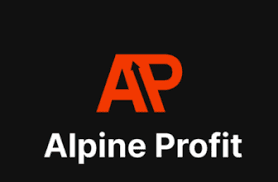
Alpine Profit
- Investigation status
- Ongoing
We are investigating Alpine Profit for allegedly attempting to conceal critical reviews and adverse news from Google by improperly submitting copyright takedown notices. This includes potential violations such as impersonation, fraud, and perjury.
- Alias
-
AlpineProfit
- Company
-
Alpine Profit
- Phone
-
+41564431278
- City
-
Zurich
- Country
-
Switzerland
- Allegations
-
Forex Scam

- https://lumendatabase.org/notices/29676349
- https://lumendatabase.org/notices/29676481
- Nov 24, 2022
- Nov 24, 2022
- Yazdan Mehrabi
- https://ext-6214246.livejournal.com/1827.html
- https://ext-6214246.livejournal.com/2274.html
- https://www.anwalt.de/rechtstipps/alpine-profit-enttaeuschende-erfahrungen-mit-broker-opfer-draengen-auf-auszahlung-205562.html
- https://www.anwalt.de/rechtstipps/betrug-ueber-alpine-profit-alpineprofit-com-erfahrungen-zur-auszahlung-205610.html
Evidence Box and Screenshots
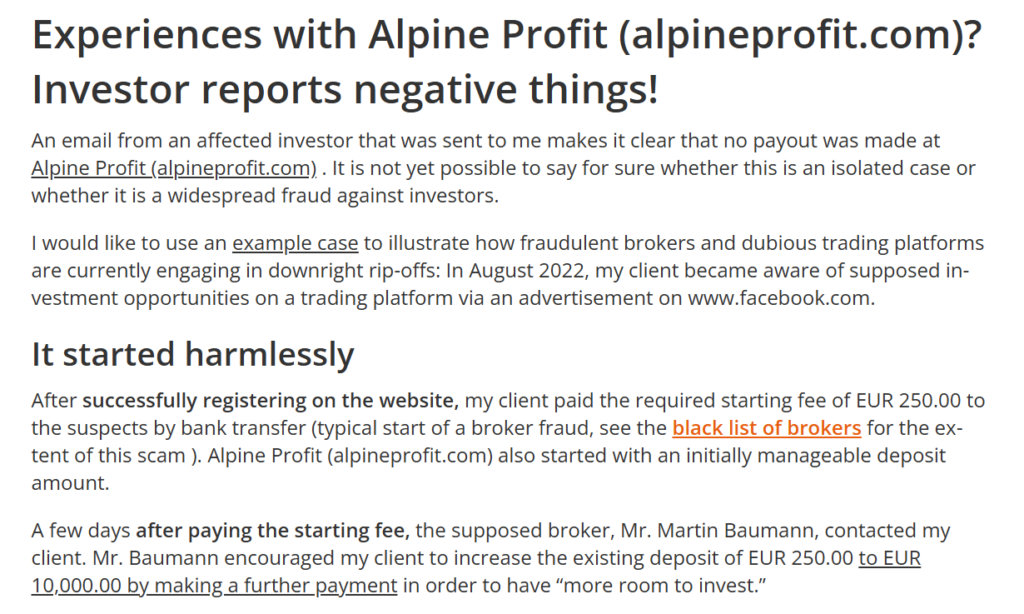
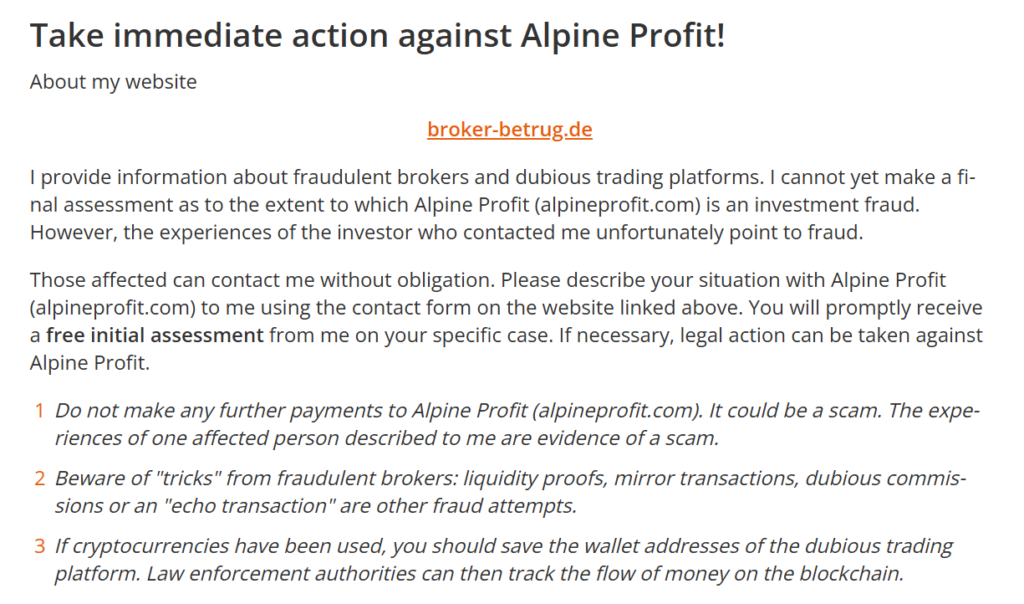


3 Alerts on Alpine Profit
- RED FLAGS
Alpine Profit: Trading Platform Practices and Market Impact
Alpine Profit poses as a forex broker but is a scam, trapping investors’ funds through deception and regulatory evasion—caution is essential.
Visit Link- RED FLAGS
Alpine Profit: Overview of Forex Trading
Alpine Profit, now Alpine Finance (original site inactive), is a forex scam using spam, fake reviews, and fund traps to exploit investors.
Visit Link- RED FLAGS
Alpine Profit: Forex Broker Overview
Alpine Profit is a predatory scam, deceiving investors with false promises while exploiting regulatory gaps to steal funds—investors should steer clear.
Visit LinkHow Was This Done?
The fake DMCA notices we found always use the ? back-dated article? technique. With this technique, the wrongful notice sender (or copier) creates a copy of a ? true original? article and back-dates it, creating a ? fake original? article (a copy of the true original) that, at first glance, appears to have been published before the true original.


What Happens Next?
The fake DMCA notices we found always use the ? back-dated article? technique. With this technique, the wrongful notice sender (or copier) creates a copy of a ? true original? article and back-dates it, creating a ? fake original? article (a copy of the true original) that, at first glance, appears to have been published before the true original.
01
Inform Google about the fake DMCA scam
Report the fraudulent DMCA takedown to Google, including any supporting evidence. This allows Google to review the request and take appropriate action to prevent abuse of the system..
02
Share findings with journalists and media
Distribute the findings to journalists and media outlets to raise public awareness. Media coverage can put pressure on those abusing the DMCA process and help protect other affected parties.
03
Inform Lumen Database
Submit the details of the fake DMCA notice to the Lumen Database to ensure the case is publicly documented. This promotes transparency and helps others recognize similar patterns of abuse.
04
File counter notice to reinstate articles
Submit a counter notice to Google or the relevant platform to restore any wrongfully removed articles. Ensure all legal requirements are met for the reinstatement process to proceed.
05
Increase exposure to critical articles
Re-share or promote the affected articles to recover visibility. Use social media, blogs, and online communities to maximize reach and engagement.
06
Expand investigation to identify similar fake DMCAs
Widen the scope of the investigation to uncover additional instances of fake DMCA notices. Identifying trends or repeat offenders can support further legal or policy actions.

Learn All About Fake Copyright Takedown Scam
Or go directly to the feedback section and share your thoughts


Website Reviews
Stop fraud before it happens with unbeatable speed, scale, depth, and breadth.
Recent Reviews

Cyber Investigation
Uncover hidden digital threats and secure your assets with our expert cyber investigation services.
Recent Reviews

Threat Alerts
Stay ahead of cyber threats with our daily list of the latest alerts and vulnerabilities.
Recent Reviews

Client Dashboard
Your trusted source for breaking news and insights on cybercrime and digital security trends.
Recent Reviews
Gamsgo
Fake DMCA Investigation
FXNovus
Fake DMCA Investigation
Scott Leonard
Fake DMCA Investigation
User Reviews
Discover what real users think about our service through their honest and unfiltered reviews.
1.7
Average Ratings
Based on 11 Ratings
Henry Blake
bro this whole site fishy as hell, soon as u deposit they ghost u fr.
12
12
Grace Vaughn
I lost $2,000 to these scammers, they never let me withdraw, just kept asking for more “verification”.
12
12
Jessica Romero
I lost $12,000 to Alpine Profit, and after weeks of getting the runaround, I’m convinced they were operating a Ponzi scheme all along don’t trust them with your money
12
12
Samuel Rice
Alpine Profit promised big returns on my $6,000, but after months of delays and manipulation, I’m still waiting for my funds to be released this company is nothing but a scam
12
12
April Powell
I invested $10,000 in Alpine Profit, only to watch it disappear after they failed to deliver any returns and then started blocking my withdrawal requests I feel totally scammed
12
12
Liam Davis
Honestly, I am trying to get my money back...I have heard only bad things about them...and now they’re trying to cover it up.
12
12
Sahil Gupta
They promise easy profits, but when things go wrong, they don’t even have the decency to communicate with you Very Bad experience????????
12
12
Isabella Walker
Very Wrost Firm they have many rule because they don't want that client request withdrawal. Pleas stay away from them
12
12
Ava Thomas
Accounts are getting locked, and users can’t access their money. They seriously need to do something to fix these issues and allow people to use the platform. Orelse they are trapping people.
12
12
William Miller
One of the worst trading conditions in any prop firm. They change the rules to suit themselves, making it nearly impossible to succeed.
12
12
Ayesha Khan
Big Scam. They promised high returns, but I ended up losing more than I invested. Really feel scammed.
12
12
You are Never Alone in Your Fight
Generate public support against the ones who wronged you!
Featured Cyber Investigations
Explore our most impactful cyber investigations, where we uncover coordinated digital deception, expose fraudulent takedown schemes, and reveal the hidden mechanics behind online manipulation.
Gamsgo
Fake DMCA Investigation
FXNovus
Fake DMCA Investigation
Scott Leonard
Fake DMCA Investigation
Claudio Teseo
Fake DMCA Investigation
Salim Ahmed...
Fake DMCA Investigation
KTV Group...
Fake DMCA Investigation
Emarlado.com
Fake DMCA Investigation
GoodSkin Clinics
Fake DMCA Investigation